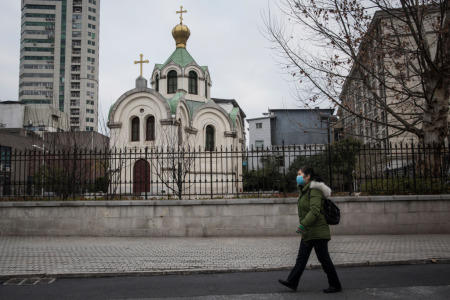China bans copying of hymns, punishes Christians who print religious materials

China has been tightening restrictions on the distribution of religious materials in recent months by threatening fines, the closure of printing shops, or even imprisonment for selling Christian books or allowing customers to photocopy hymns.
Bitter Winter, a publication that monitors religious liberty violations in China, reports that this month, Chinese Communist Party officials in Luoyang, a prefecture-level city in the central province of Henan, searched a local printing house for banned religious materials.
“Any religious content makes the issue political, not religious. Although banners on the streets say people are allowed religious beliefs, the only faith they can practice freely is that in the Communist Party,” a store manager told Bitter Winter.
Because inspections are “too rigorous,” the manager said he refuses to print religious materials.
“They checked my storehouse, scrutinized all records, and even looked at paper sheets on the floor, to see if they have prohibited content,” the manager told Bitter Winter. “If any such content is found, I’ll be fined, or worse, my business will be closed.”
A worker at a second photocopying business in Luoyang revealed that the ban on illegal religious materials applies to the photocopying of hymns. Those who print religious materials face harsh repercussions, including fines, and in some cases, imprisonment.
“I don’t even dare to make copies of two sheets with religious hymns because of strict investigations,” the worker said. “I was told to report anyone who comes to copy religious materials.”
A worker at another shop told Bitter Winter, “If we are not sure if a text is religious, we must keep its copy and report it to authorities.”
Unapproved religious publications imported from other countries are labeled as “contraband.”
“The government exerts strict control over mailed goods this year,” a staff member at a courier company in Luoyang said. “Only the mailing of government-approved books is allowed. All books with ‘bad information,’ including religion, are not allowed to be dispatched. If public security authorities discover violations of these regulations, the company will be fined and closed down.”
Last month, Chen Yu, a Christian who operated his online bookstore in Zhejiang province’s Taizhou city, was sentenced to seven years in prison and fined 200,000 RMB ($29,450) for selling unapproved religious publications.
Police also reportedly launched a nationwide investigation to track down the bookstore’s customers through sale records and confiscate their purchased books.
A house church preacher from Shandong also told Bitter Winter that the police investigated him after discovering that he had purchased religious materials on Taobao.com, a Chinese online shopping website.
“It seems to me that the government can access anything; I feel like I am running naked,” the preacher said.
In April 2018, the Chinese government banned online retailers from selling the Bible. Legally, the Bible can only be distributed by government-approved agencies that supervise the Christian churches in China.
In recent years, religious persecution by China's communist party has intensified. In efforts to bring Christianity under Chinese influence, government officials force believers to follow specific rules and regulations and have imposed further restrictions on unregistered church gatherings.
The CCP has also amped up measures to destroy religious symbols. In the first half of 2020 alone, over 900 crosses were removed from state-run churches across China.
In several provinces across the country, authorities have ordered residents to replace pictures of Jesus with those of Chairman Mao and those of General Secretary Xi Jinping.
This month, it was reported that CCP officials ordered dozens of churches to replace crosses with the five-pointed star, the symbol featured on the country’s flag to represent the CCP and its role in the nation.
China is ranked as one of the worst countries in the world when it comes to the persecution of Christians, according to Open Doors USA’s World Watch List.
The communist regime's crackdown on religious freedom has also led the U.S. State Department to label it as a “country of particular concern” for “continuing to engage in particularly severe violations of religious freedom.”
In a recent interview with The Christian Post, U.S. Secretary of State Pompeo said it is “certainly the case that the Chinese Communist Party [engages in] efforts to stamp out religious freedom every place that they find.”
“[The] Chinese Communist Party has a very low threshold for permitting people to practice their own faiths,” he said. “We think that is greatly to the harm of the country, but we know that it is to the detriment of the Chinese people themselves.”
“I would advocate not only for every Christian but every human being to come and understand that nations are better and more successful when they observe the fundamental human rights that are accrued to every human being just by the nature of their humanness.”





















